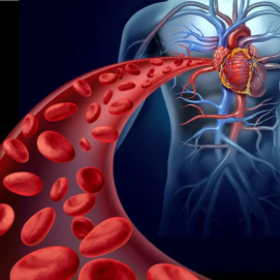Most of my blogs so far been about my life as a PhD student, however, I think it’s important that every now and again I give you a little bit of an insight into my research area. So, this blog is going to be a whistle stop tour about the importance of blood flow and the links between blood flow and Alzheimer’s disease – so saddle up!
Firstly, what you need to know it that your brain is a VERY energy demanding organ – it’s always hungry and needs a constant supply of energy. In fact, your brain is only 2% of your body weight but actually consumes around ~20% of the body’s energy supply (in the form of oxygen and glucose). Even though your brain needs this constant energy supply it’s unfortunately not figured out how to store reserves of energy – which creates a bit of a problem for your brain.
So, how do the cells within your brain get the energy they need? Well, through your blood! Your brain has miles and miles of blood vessels – in fact, there are around 400 miles of blood vessels inside your brain – basically the length from London to Edinburgh! Blood flow to the brain is so important because it’s the blood that delivers the oxygen and glucose to the cells and takes away any toxins. So, if blood flow to the brain is reduced or worse, stopped, your brain cells don’t get the energy they need to survive and unfortunately become damaged or even worse, they die.
But how does this link to Alzheimer’s disease?
Before I tell you, I’m going to give you a quick recap on what Alzheimer’s disease is. Alzheimer’s disease is the most common cause of dementia; however, it is not a normal part of ageing. It’s a brain disease, which leads to individuals developing memory issues, difficulties with language and results in individuals finding it more difficult to complete everyday tasks over time. We still don’t fully understand the disease, but research has shown that the disease is caused by a build-up of proteins within the brain which damage neurons. Amyloid beta (one of the proteins involved in the disease) can clump together between neurons in what we call ‘plaques’. Another protein which has received a lot of attention is tau, this protein can build up inside neurons, and form ‘tangles’ which lead to neuron damage and death.

The circulatory system in the human body stretches 66,000 miles, more than two and a half times the circumference of the Earth.
However, amyloid plaques and tau tangles are not the only features observed in the brain in Alzheimer’s disease. Increasing research suggests that early on in the disease changes to brain vasculature may occur. This led to a new hypothesis of Alzheimer’s disease – known as the two-hit vascular hypothesis. This idea suggests that there are many factors that can damage brain blood vessels, which include lifestyle, genetic and vascular factors. These vascular changes can damage different cell types within the brain that help regulate blood flow, ultimately leading to the narrowing of small arteries inside the brain as well as damaging the protective barrier of cells surrounding capillaries in the brain. These changes to the small vessels inside the brain can result in a reduction of blood flow to the brain and this in turn can impact the production and clearance of the amyloid beta protein that we’ve previously mentioned. The increase in production and reduction in clearance in amyloid beta, as well as the reduction in blood flow can then result in changes to tau within neurons – with inflammation within the brain also becoming increased. All of these changes together can result in increased damage to neurons and neuron death, which ultimately lead to the cognitive symptoms of Alzheimer’s disease.
As you can see Alzheimer’s disease is a very complicated brain disease that scientists are still trying hard to fully understand.
However, there is lots of research supporting this idea. For example, in one study scientists analysed thousands of brain scans as well as investigating different markers in the cerebral spinal fluid of individuals to learn more about Alzheimer’s disease. They found that changes in blood vessels of the brain were one of the earliest changes to be seen in Alzheimer’s disease, with these changes occurring much earlier than any structural changes than can be seen in the brain.
There are also many studies that have shown that people with Alzheimer’s disease and people at risk of AD have a reduction in blood flow in the brain compared to healthy controls.
Scientists have started to research if increasing blood flow could potentially help in Alzheimer’s disease. One study, using mice with two of the genes linked to Alzheimer’s disease did find that increasing brain blood flow improved cognition into late stages of the disease – however lots more research is still needed in this area to really find out if increasing blood flow could be a potential treatment in Alzheimer’s disease.
I hope after reading this you’ve got a bit more of an insight into why blood flow to the brain is so important and how this could be linked to the development of Alzheimer’s disease. As a PhD student who is just starting out in their career as a scientist, I feel so privileged to be involved in such an exciting and important field. Scientists are working really hard to understand as much as they can about this brain disease, because the more we know the closer we get to potential treatments.

Beth Eyre
Author
Beth Eyre is a 2nd year PhD Student at The University of Sheffield, researching Neurovascular and cognitive function in preclinical models of Alzheimer’s disease. Beth has a background in psychology, where she gained her degree from the University of Leeds. Inside and outside the lab, Beth loves sharing her science and we are delighted to have her contributing as a regular blogger with Dementia Researcher, sharing her work and discussing her career.

 Print This Post
Print This Post




